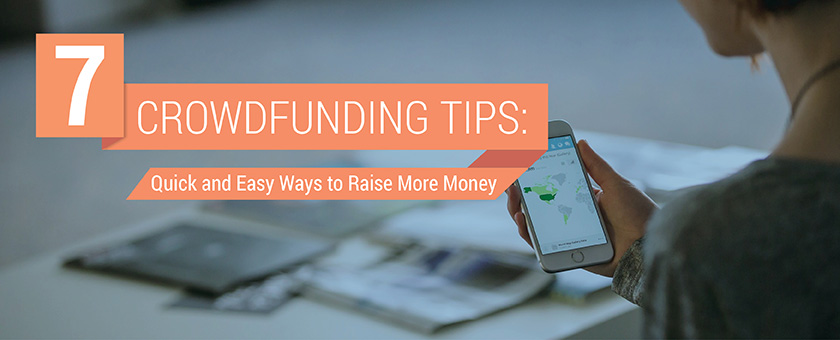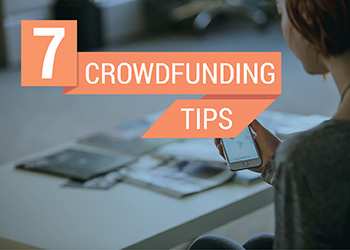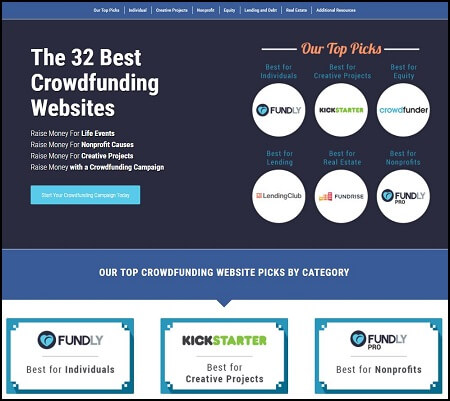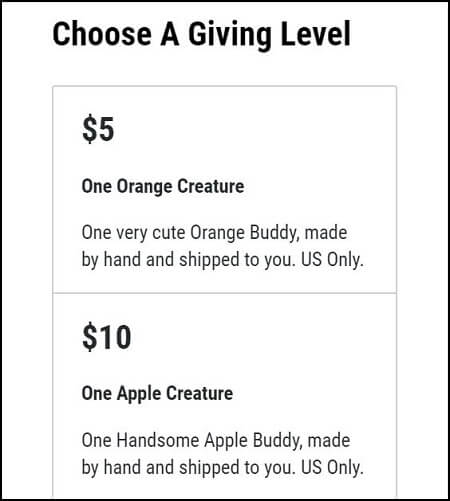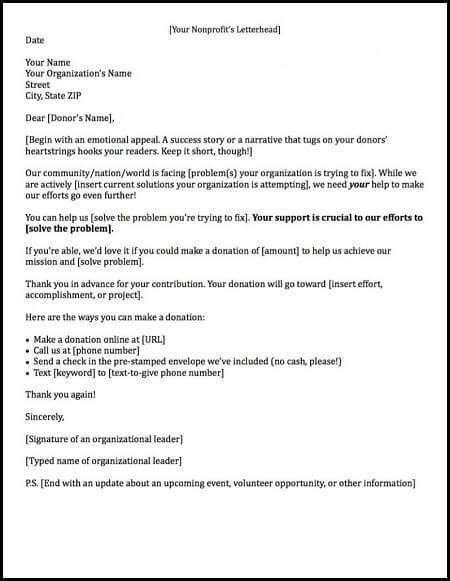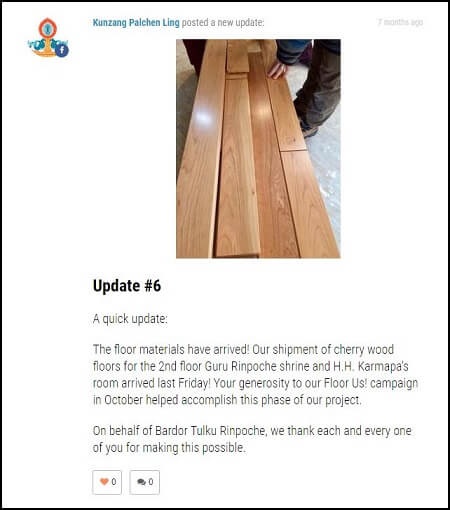7 Crowdfunding Tips: Quick and Easy Ways to Raise More Money
If you’re about to launch a crowdfunding campaign (or you’re in the middle of running one right now), you might be wondering how you can raise more money more quickly.
This urgency can be multiplied if you’re using an “All-or-Nothing” (AoN) platform that only lets you keep your funds if you reach your fundraising goal.
Luckily, we’ve got some of the best crowdfunding tips that can help you raise more money and awareness for your cause, project, or event.
- Research and Prepare
- Ask for Donations Early
- Ask the Right People for Donations
- Be Specific About What the Money’s Going Toward
- Offer Incentives (When You Can)
- Write Compelling Copy When You Share Your Crowdfunding Page
- Update Your Crowdfunding Page
How you implement these crowdfunding tips will likely depend on the type of campaign you’re running and the platform you’re using. Adjust and tweak them as necessary.
Crowdfunding Tip #1: Research and Prepare
This particular piece of advice won’t work for campaigns where there is an emergency need or a very close deadline, but if you have the time to plan for your crowdfunding campaign, you definitely should.
The most successful crowdfunding campaign organizers take an average of 11 days to research and prepare for their campaign’s launch. You may find that you need more or less time depending on your campaign type and fundraising needs.
Researching and preparing includes:
- Checking out the top fundraising advice the web has to offer.
- Choosing an awesome crowdfunding platform.
- Taking a look at other successful campaigns to get an idea of what they did right.
- Learning more about how to ask for donations.
- Deciding whether or not you should host an event to go with your campaign.
- Looking for more fundraising ideas.
These resources are a great place to start, but there are many, many more helpful articles, videos, and tips out there.
For example: The resource listed below can help you jump-start your crowdfunding research and pick a platform.
Crowdfunding Tip #2: Ask for Donations Early
Many crowdfunding campaign organizers make the mistake of setting up a campaign page and assuming that people will find it.
There are nearly 200 different crowdfunding platforms in the U.S. alone.
The chances that someone will stumble across your crowdfunding campaign and feel compelled to donate to a complete stranger are extremely low.
But all is not lost! By promoting your campaign on the same day you set it up (and the early days that follow), you can position yourself for crowdfunding success.
In fact, nearly half of successful campaigns’ funds are raised in the first and last 3 days of the campaign’s duration.
This means that you have a short window to get the word out and ask for donations from your:
- Friends
- Family members
- Community members.
Nearly every crowdfunding platform has built-in sharing mechanisms that allow you to spread the word about your campaign via email, Facebook, Twitter, and other social media platforms. So, it is critical that you take full advantage.
For example: The promotion pictured below occurred as early as Day 2 of the campaign.
Crowdfunding Tip #3: Ask the Right People for Donations
You know your network best. You, more than anyone, can likely tell if someone would be receptive to giving to your crowdfunding campaign.
For instance, someone who has lost a loved one to cancer will probably want to contribute to a crowdfunding campaign that’s raising money for cancer research.
Similarly, if you are running a crowdfunding campaign for a certain politician, you probably aren’t likely to receive any donations from friends and family members who belong to a different political party or who have dissimilar political ideals.
Both situations are to be expected when raising money.
Not everyone is going to be as enthusiastic about your cause or project as you are. And that’s okay.
But if you want to make the most of your time and energy (and increase the chances of your crowdfunding campaign’s success), you shouldn’t reach out to people who aren’t likely to contribute to your campaign.
Do your best to focus your energy on outreach that will have the highest return on your investment.
Just remember, to an extent, crowdfunding is a numbers game. So, while you want to be strategic about your outreach, you shouldn’t be so strategic that you end up narrowing your options.
For example: The organizer of the campaign below knew he had a built-in, qualified prospect pool through his Instagram followers.
Crowdfunding Tip #4: Be Specific About What the Money’s Going Toward
Very few supporters will want to give to a vague crowdfunding campaign that doesn’t even hint at where the funds will go.
The more specific you can be when talking about how donations will be used, the better!
If you can, try to separate donations out into giving levels that delineate exactly what each amount will help you accomplish. Being clear about where you’ll allocate the funds you raise establishes transparency with your donors, making it more likely that they’ll trust you and give to the campaign.
For example, you could do what the Austin Habitat for Humanity’s crowdfunding campaign did.
This campaign was raising money to build homes in Austin. The organizer decided to break out the giving levels by what the organization would be able to purchase with each gift amount.
Because of this structure, donors were able to see that a $75 donation would buy a kitchen sink while a $200 donation could buy a bath or shower.
For example: Check out the giving levels specified by Habitat for Humanity.
Crowdfunding Tip #5: Offer Incentives (When You Can)
Incentives are great perks for donors, but they really only work for certain types of campaigns.
For example, if you’re trying to raise money to pay for funeral or memorial costs, you probably don’t have the time or energy to create incentives for donors to receive after they give a certain amount.
But crowdfunding campaigns for creative projects, trips and adventures, and even weddings and honeymoons can be the perfect opportunity to offer incentives to your donors for giving to your project or event.
The types of incentives or products that you offer typically depend on what you’re raising money for. We’ve seen campaigns offer incentives such as:
- T-shirts
- Caps and hats
- Handmade crafts
- Media shout-outs
- Free tickets to a show, concert, or game
Offering incentives not only gives your donors something to remember your campaign by, it also encourages them to give even more!
If you have different giving tiers that correspond to different perks or incentives, people are likely to choose a higher giving level or at least a level that has a perk that they’ll enjoy.
For example: Check out the incentives offered by this crowdfunding campaign organizer.
Crowdfunding Tip #6: Write Compelling Copy When You Share Your Crowdfunding Page
Most crowdfunding platforms will generate a general sentence or two that goes along with your campaign’s URL whenever you share it via email or social media.
While this feature is convenient for quickly sending out campaign promotions, it creates a cookie-cutter experience for your followers and supporters.
If your campaign promotions sound like everyone else’s, then there’s nothing to distinguish your crowdfunding campaign from the dozens of others that are likely floating through your friends’ and family members’ social media feeds.
Instead, modify that general copy to fit your crowdfunding campaign.
You can:
- Tell your story (but keep it short!).
- Let donors know what the funds will go toward.
- Give an example of your past accomplishments.
- Talk about how much you’ve raised and how much more you need.
- And more!
However you choose to personalize your communications, make sure that you keep them short. It shouldn’t take your supporters 15 minutes to figure out that you’re asking for donations. The purpose of the email, Facebook post, tweet, or other promotion should be immediately clear.
For example: Your copy should be in line with the language included in this fundraising letter template.
Crowdfunding Tip #7: Update Your Crowdfunding Page
A crowdfunding campaign is an ongoing fundraiser. Unlike a fundraising event (which is typically a one-day affair), a crowdfunding campaign can last weeks and even months and requires maintenance on your part.
Updating your crowdfunding page is important for a couple of reasons:
- An updated campaign page, complete with new photos and written updates, looks more appealing than one that hasn’t changed since the day it was set up. It shows that you’re invested in your campaign (and that you want others to be invested, as well!).
When you update your crowdfunding campaign page, you keep your donors in the loop. - People who have given — or who are considering giving — to your campaign want to know the progress of your project or event. When you post updates and keep your crowdfunding campaign page looking fresh, you can give your supporters an idea of what their donations have gone (or will go!) toward.
Of course, you’ll want to write and post updates that your supporters will actually want to read. Keep your posts short and engaging, and include images or videos when/if you can.
For example: This campaign not only follows our crowdfunding tip about updating, it even includes a progress-related image.
Including updates about your crowdfunding campaign can help boost your fundraiser’s success. Add media to keep your supporters in the loop about your progress!
Well, there you have it: the top seven crowdfunding tips that will help you raise more money for your project, event, or cause. Make sure to share this post with your friends and family members so that they can make the most of their crowdfunding campaigns, too!
If you want to learn more about crowdfunding, check out these additional resources:
- Keep Your Crowdfunding Momentum Going. Traditionally crowdfunding campaigns generate a ton of interest in the first few weeks, but to reach your goal, you’ll have to maintain that momentum. Use the tips this guide to help.
- Crowdfunding 101. Feel like you need to go back to the basics? No worries! Check out our beginner’s guide to crowdfunding to learn more about fundraising online.
- How to Ask for Donations. Asking for contributions can be tricky, especially if you don’t have experience. Use this guide to help you solicit donations like a pro.


